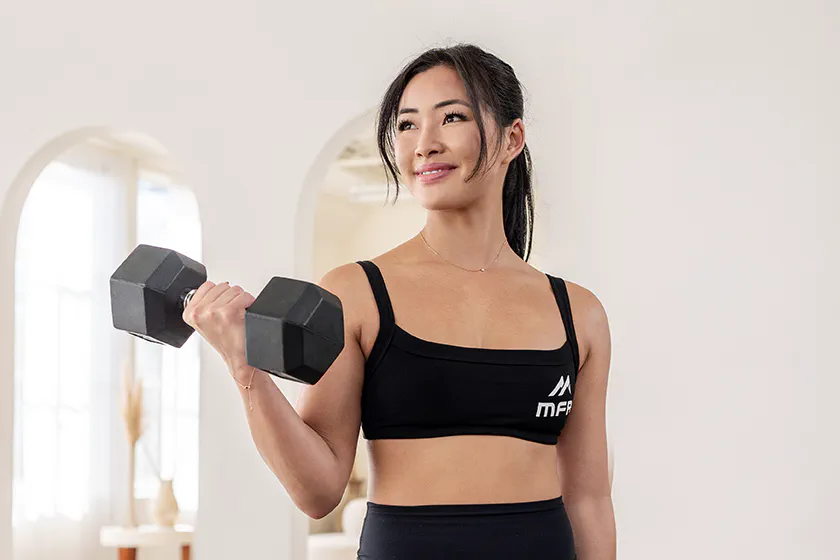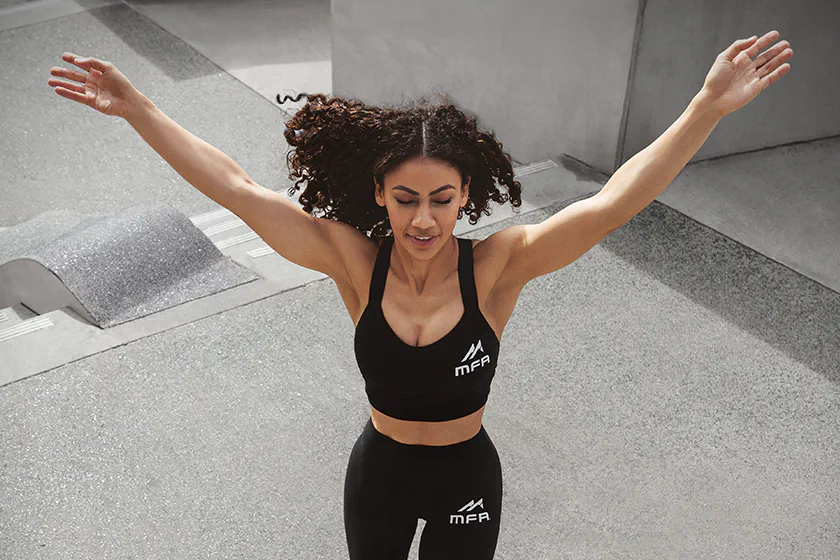Exercise and Estrogen: What Every Woman Needs to Know

Meet the female hormone that keeps you lean and strong
When most of us think about estrogen, we think about how it gives women curves and squishy bits that are beloved by men the world over. Or we think about the hormone in reproductive terms only, i.e., pink-cheeked babies and keeping the species going.
All of our reproductive hormones, especially estrogen, play a key role in many of our body’s critical functions, including cholesterol levels, blood circulation, bone density, and heart, and brain health.
Estrogen can even impact how easy it is to lose weight and get fit. For example, when it comes to exercise and fitness, estrogen impacts:
- Muscle strength
- Exercise recovery
- Metabolism
This Is Your Body on Estrogen
Estrogen is one of the two hormones in the female reproductive cycle (the other is progesterone). Estrogen fluctuates during menstruation and throughout a woman’s lifespan, dropping to negligible levels after menopause.
Estrogen is primarily produced in the ovaries, but some of the hormone is produced in the adrenal glands and fat tissue. There are three forms of estrogen: estradiol, estrone, and estriol.
Estradiol is the main variation produced before menopause and the most potent form of the hormone, while estrone is a weaker version that is predominant after menopause. Estriol is another weak estrogen, mostly made during pregnancy.
How Estrogen Impacts Exercise
Muscle Mass and Strength
Estrogen helps women build muscle. Yep, the hormone most responsible for soft curves can give you hard biceps. Estrogen receptors are found in skeletal muscle and play a role in muscle growth.
Women often experience a sharp decline in muscle strength and size at menopause due to the loss of estrogen. Hormone replacement therapy can help women maintain muscle mass. If you are in menopause, and interested in trying it, you would need to talk with a doctor to see if you are a candidate. Research is now supporting its use in menopausal women.
Researchers recently found that when estrogen leaves the building, muscle stem cells also disappear. Our bodies need these satellite cells for the growth, repair, and regeneration of skeletal muscle. Estrogen loss also increases the risk of cellular death, which leads to a decrease in muscle.
It’s been said that muscle is the organ of longevity, which is one of the reasons strength training is so important. Women who lift weights two or three times a week actually live longer than those who don’t and are less likely to die from heart problems.
Exercise Recovery
When you exercise hard, you’re putting your body through a lot, and estrogen can help you recover from that exhausting HIIT session. Estrogen reduces inflammation, muscle damage, and soreness.
High estrogen levels can shorten your recovery time as well. Low estrogen leads to an increase in bone fractures and bone loss. Ironically, when estrogen is high, women are more likely to suffer from tendon damage and ligament injuries.
Estrogen levels are highest when women are ovulating (releasing an egg). This is the perfect time to hit the gym hard. It’s a great time for heavy cardio and muscle building, while low-impact exercises are better when estrogen is at its lowest during the luteal phase, which occurs after ovulation.
Metabolism
Most of us gain weight with age. For women, these changes are related to both aging and hormone loss. As women go through menopause, estrogen decreases, and this not only increases overall weight gain but increases the risk for the dreaded “meno belly”. This means all your extra pounds are more likely to go to your midsection.
As a woman goes through menopause, testosterone, relative to estrogen, can be higher, which means that she may gain weight as men do, in the upper body. Plus, estrogen makes you less likely to pig out because it reduces hunger signals so you don’t eat as much, while the loss of estrogen can increase the hunger hormone ghrelin, making you eat more.
Bottom Line
Estrogen truly is a girl’s best friend. This multitasking hormone does it all. It protects our hearts, our bones, and our brains. It helps women build muscle, stay strong, and be lean, mean, calorie-burning machines.
When estrogen levels decline, many women notice several undesirable side effects such as weight gain and a harder time recovering after a work-out. That’s why understanding and supporting estrogen balance is essential for lifelong vitality and well-being.
Kaye Smith, PhD, is a seasoned behavioral health coach and psychologist with a specialization in women’s sexual health. With 20+ years of experience spanning psychotherapy, academia, and content development, she supports women managing anxiety, depression, stress, and menopause. Dr. Smith has contributed to the work of renowned sexologist Dr. Betty Dodson and written for platforms including Hello Clue, O.school, and Medium. Leveraging expertise in CBT, mindfulness, and motivational interviewing, she delivers clear, evidence-based insights on mental health and wellness.



